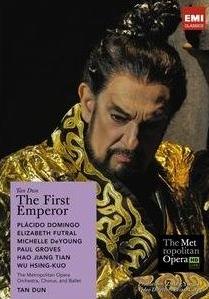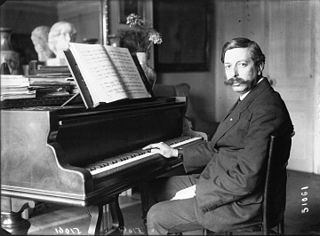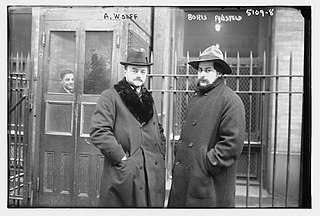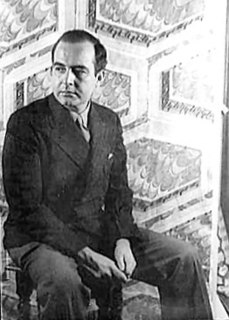 W
WAntony and Cleopatra, Op. 40, is an opera in three acts by American composer Samuel Barber. The libretto was prepared by Franco Zeffirelli. It was based on the play Antony and Cleopatra by William Shakespeare and made use of Shakespeare's language exclusively.
 W
WThe Canterbury Pilgrims is an opera by the American composer Reginald De Koven. It premiered at the Metropolitan Opera House on March 8, 1917. The libretto, written by Percy MacKaye, is loosely based on Geoffrey Chaucer's The Canterbury Tales.
 W
WCyrano is an opera in four acts composed by Walter Damrosch to an English language libretto by William James Henderson based on Edmond Rostand's 1897 play, Cyrano de Bergerac. It premiered at the Metropolitan Opera in New York City on February 27, 1913, with Pasquale Amato in the title role and Frances Alda as Roxane.
 W
WThe Emperor Jones is an opera in two acts with a prologue and interlude composed by Louis Gruenberg to an English-language libretto adapted by the composer from Eugene O'Neill's 1920 play, The Emperor Jones. It premiered on January 7, 1933, at the Metropolitan Opera in New York City with Lawrence Tibbett in the title role. Set on an unnamed island in the West Indies, the opera tells the story of African American Brutus Jones, a former Pullman porter and ex-convict who escaped to the island, set himself up as its tyrannical "Emperor", and became rich by exploiting the natives. The natives start a revolt against him, and as he tries to escape through the jungle, he is haunted by visions of his past life and the man he had murdered. As the natives close in, he commits suicide using the silver bullet which he had worn around his neck as a good-luck charm. With a score that incorporates elements of jazz and negro spirituals, The Emperor Jones was the eleventh American opera to premiere at the Met, and has continued to be performed into the 21st century, albeit rarely.
 W
WThe Enchanted Island is a pasticcio (pastiche) of music by various baroque composers, including George Frideric Handel, Antonio Vivaldi, and Jean-Philippe Rameau, devised and written by Jeremy Sams after The Tempest and A Midsummer Night's Dream by William Shakespeare. It was created by Julian Crouch and Phelim McDermott and premiered by the Metropolitan Opera on December 31, 2011, starring David Daniels, Joyce DiDonato, Danielle de Niese, Luca Pisaroni, and Lisette Oropesa. The popular 70-year-old Spanish tenor, Plácido Domingo, played the small but important part of the sea god Neptune. The following month a performance of the pasticcio was broadcast live into movie theaters across the world as part of the Metropolitan Opera Live in HD series. In late 2012, Virgin Classics released this broadcast version on DVD. The Met revived The Enchanted Island two seasons later. Daniels, de Niese, Pisaroni, and Domingo revived their roles from the premiere. Susan Graham assumed the role of Sycorax from DiDonato.
 W
WLa fanciulla del West is an opera in three acts by Giacomo Puccini to an Italian libretto by Guelfo Civinini and Carlo Zangarini, based on the 1905 play The Girl of the Golden West by the American author David Belasco. Fanciulla followed Madama Butterfly, which was also based on a Belasco play. The opera has fewer of the show-stopping highlights that characterize Puccini's other works, but is admired for its impressive orchestration and for a score that is more melodically integrated than is typical of his previous work. Fanciulla displays influences from composers Claude Debussy and Richard Strauss, without being in any way imitative. Similarities between the libretto and the work of Richard Wagner have also been found, though some attribute this more to the original plot of the play, and have asserted that the opera remains quintessentially Italian.
 W
WThe First Emperor is an opera in two acts with music by Tan Dun and a libretto written in English by Tan Dun and Ha Jin. The opera received its world premiere at the Metropolitan Opera at Lincoln Center in New York City on 21 December 2006, conducted by the composer with Plácido Domingo in the title role. It was broadcast live to hundreds of cinemas around the world on 13 January 2007 as part of the Met Live in HD season. The following year, EMI released this movie broadcast on DVD. The opera was a co-production between the Metropolitan Opera and the Los Angeles Opera and was described to be the most elaborate Metropolitan opera production since War and Peace.
 W
WGianni Schicchi is a comic opera in one act by Giacomo Puccini to an Italian libretto by Giovacchino Forzano, composed in 1917–18. The libretto is based on an incident mentioned in Dante's Divine Comedy. The work is the third and final part of Puccini's Il trittico —three one-act operas with contrasting themes, originally written to be presented together. Although it continues to be performed with one or both of the other trittico operas, Gianni Schicchi is now more frequently staged either alone or with short operas by other composers. The aria "O mio babbino caro" is one of Puccini's best known, and one of the most popular arias in opera.
 W
WGoyescas is an opera in one act and three tableaux, written in 1915 by the Spanish composer Enrique Granados. Granados composed the opera to a Spanish libretto by Fernando Periquet y Zuaznabar with melodies taken from his 1911 piano suite, which was also called Goyescas. The opera was first performed at the Metropolitan Opera in New York City on January 28, 1916.
 W
WThe Island God is a one-act opera by Gian Carlo Menotti with a libretto by the composer. It was first performed on February 20, 1942, at the Metropolitan Opera in New York City.
 W
WThe King's Henchman is an opera in three acts composed by Deems Taylor to an English language libretto by Edna St. Vincent Millay. The libretto is based on both legend and historical figures documented in the Anglo-Saxon Chronicle including Edgar the Peaceful, Elfrida of Devon, and Dunstan. It tells the story of a love triangle between King Eadgar, his henchman Aethelwold, and Aelfrida, daughter of the Thane of Devon. It premiered on 17 February 1927 at the Metropolitan Opera in New York City in a performance conducted by Tullio Serafin.
 W
WKönigskinder is a stage work by Engelbert Humperdinck that exists in two versions: as a melodrama and as an opera or more precisely a Märchenoper. The libretto was written by Ernst Rosmer, adapted from her play of the same name.
 W
WThe Legend is a one-act tragic opera composed by Joseph Carl Breil to an English libretto by Jacques Byrne. It premiered at the Metropolitan Opera in New York City on March 12, 1919 in a triple bill with two other one-act operas, John Hugo's The Temple Dancer and Charles Cadman's Shanewis. Its melodramatic story is set in Muscovadia, a mythical country in the Balkans, and involves an impoverished nobleman turned bandit, his daughter Carmelita, and her lover Stephen, a captain in the hussars. The action unfolds over a single night at the end of which both lovers are dead—Stephen stabbed to death by Carmelita and Carmelita shot by Stephen's fellow hussars. The only one of Breil's six operas to be performed by a major opera company, The Legend received scathing press reviews and after its three performances at the Met disappeared from the repertory.
 W
WMadame Sans-Gêne is an opera in three acts by Umberto Giordano. The libretto was taken from Victorien Sardou and Émile Moreau's play, adapted for the opera by Renato Simoni.
 W
WMerry Mount is an opera in three acts by American composer Howard Hanson; its libretto, by Richard Stokes, is loosely based on Nathaniel Hawthorne's short story "The May-Pole of Merry Mount", taken from his Twice Told Tales. Hanson's only opera, it was commissioned by the Metropolitan Opera in New York City.
 W
WMona is an opera in three acts by composer Horatio Parker with an English libretto by Brian Hooker. The opera premiered at the Metropolitan Opera on 14 March 1912 after the work won the Met's composition competition in 1911.
 W
WMourning Becomes Electra is an opera in 3 acts by composer Marvin David Levy. The work uses an English language libretto by Henry W. Butler after the 1931 play of the same name by Eugene O'Neill.
 W
WL'oiseau bleu is an opera in four acts by the French composer and conductor Albert Wolff. The libretto by Maurice Maeterlinck is based on his 1908 play of the same name. Boris Anisfeld designed the sets.
 W
WPeter Ibbetson is an opera in three acts by American composer Deems Taylor from a libretto by the composer and Constance Collier, based on the 1891 novel by George du Maurier. Taylor's music is attractive, often dramatically apposite, and vocally grateful. Certain passages in Peter Ibbetson are effective and moving.
 W
WSuor Angelica is an opera in one act by Giacomo Puccini to an original Italian libretto by Giovacchino Forzano. It is the second opera of the trio of operas known as Il trittico. It received its world premiere at the Metropolitan Opera on December 14, 1918.
 W
WIl tabarro is an opera in one act by Giacomo Puccini to an Italian libretto by Giuseppe Adami, based on Didier Gold's play La houppelande. It is the first of the trio of operas known as Il trittico. The first performance was given on 14 December 1918 at the Metropolitan Opera in New York City.
 W
WIl trittico is the title of a collection of three one-act operas, Il tabarro, Suor Angelica, and Gianni Schicchi, by Giacomo Puccini. The work received its world premiere at the Metropolitan Opera on 14 December 1918.
 W
WVanessa is an American opera in three acts by Samuel Barber, opus 32, with an original English libretto by Gian Carlo Menotti. It was composed in 1956–1957 and was first performed at the Metropolitan Opera in New York City on January 15, 1958 under the baton of Dimitri Mitropoulos in a production designed by Cecil Beaton and directed by Menotti. Barber revised the opera in 1964, reducing the four acts to the three-act version most commonly performed today.
 W
WThe Voyage is an opera in three acts by the American composer Philip Glass. The English/Latin/Spanish libretto was written by David Henry Hwang.